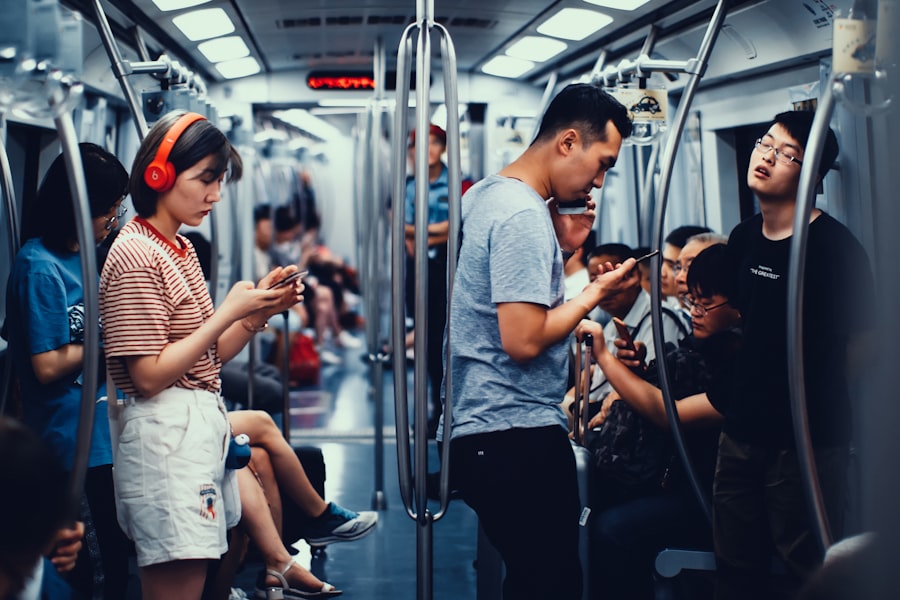In today’s digital age, social media has become an integral part of your daily life. You likely find yourself scrolling through feeds, liking posts, and sharing moments with friends and family. However, this seemingly harmless activity can quickly spiral into a compulsive behavior known as social media addiction.
This phenomenon is characterized by an excessive preoccupation with social media platforms, leading to negative consequences in various aspects of your life. As you navigate through your day, you may notice that your attention is often diverted to your phone or computer, checking for updates or notifications, even when it’s not necessary. Social media addiction can manifest in various ways, from spending hours online to feeling anxious when you’re unable to access your accounts.
It’s essential to recognize that this addiction is not merely a personal failing; it is a complex interplay of psychological, social, and neurological factors. Understanding the underlying mechanisms of social media addiction can help you identify its impact on your life and take steps toward healthier habits. As you delve deeper into this topic, you will uncover the intricate relationship between social media use and mental health, self-esteem, and overall well-being.
Key Takeaways
- Social media addiction is a growing concern with significant impact on mental health.
- The dopamine reward system plays a key role in social media addiction, leading to compulsive use.
- Social comparison on social media can fuel addiction by triggering feelings of inadequacy and low self-esteem.
- Fear of missing out (FOMO) drives excessive social media use and contributes to addiction.
- Social media addiction can have detrimental effects on self-esteem, impulse control, and anxiety, impacting decision-making and judgment.
The Dopamine Reward System and Social Media
At the heart of social media addiction lies the brain’s dopamine reward system. When you engage with social media—whether by liking a post, receiving a comment, or gaining a new follower—your brain releases dopamine, a neurotransmitter associated with pleasure and reward. This release creates a sense of euphoria that reinforces your behavior, encouraging you to return to the platform for more.
Each notification acts as a small reward, prompting you to check your phone repeatedly throughout the day. This cycle of reward and reinforcement can lead to compulsive behavior. You may find yourself seeking out likes and comments as a way to boost your mood or validate your self-worth.
Over time, the need for these digital affirmations can overshadow other aspects of your life, leading to a dependency on social media for emotional fulfillment. Understanding this connection between dopamine and social media use is crucial in recognizing how easily you can fall into the trap of addiction.
The Role of Social Comparison in Social Media Addiction

Social comparison plays a significant role in fueling social media addiction. As you scroll through curated images and posts from friends and influencers, it’s natural to compare your life to theirs. You might find yourself questioning your achievements, appearance, or lifestyle choices in light of what you see online.
This constant comparison can lead to feelings of inadequacy and low self-esteem, driving you to spend even more time on social media in search of validation. The desire to present an idealized version of yourself online can further exacerbate this cycle. You may feel pressured to post only the best moments of your life, leading to a distorted perception of reality.
This pressure can create a vicious cycle where you feel compelled to engage more with social media to maintain your online persona while simultaneously feeling worse about yourself. Recognizing the impact of social comparison on your mental health is essential in breaking free from the addictive patterns associated with social media use.
The Impact of Fear of Missing Out (FOMO) on Social Media Addiction
| Metrics | Findings |
|---|---|
| Percentage of social media users experiencing FOMO | 70% |
| Frequency of social media usage | More than 5 hours per day |
| Impact on mental health | Increased anxiety and stress levels |
| Relationship with sleep patterns | Disrupted sleep due to late-night social media scrolling |
| Effect on productivity | Decreased focus and productivity in daily tasks |
Fear of Missing Out (FOMO) is another powerful driver behind social media addiction. In an age where events, gatherings, and experiences are constantly shared online, it’s easy to feel left out if you’re not actively participating in the digital conversation. You may find yourself checking social media frequently to stay updated on what others are doing, fearing that you might miss out on something exciting or important.
This fear can lead to compulsive checking behaviors, where you feel an overwhelming urge to stay connected at all times. The anxiety associated with FOMO can create a cycle of dependence on social media as you seek reassurance that you are included in the lives of others.
The Influence of Social Media on Self-Esteem and Mental Health
The impact of social media on self-esteem and mental health cannot be overstated. As you engage with various platforms, you may find that your self-worth becomes increasingly tied to the number of likes, comments, or followers you receive. This external validation can create a fragile sense of self-esteem that fluctuates based on your online interactions.
When posts receive little engagement, it can lead to feelings of rejection or inadequacy. Moreover, studies have shown that excessive social media use is linked to increased rates of anxiety and depression. The constant exposure to idealized images and lifestyles can create unrealistic expectations for yourself and others.
You may begin to internalize these comparisons, leading to negative self-talk and diminished mental health. Recognizing the detrimental effects of social media on your self-esteem is crucial in fostering a healthier relationship with these platforms.
The Connection Between Social Media Addiction and Impulse Control

Social media addiction is closely tied to issues of impulse control. You may find it challenging to resist the urge to check your phone or scroll through your feed, even when you know it’s not beneficial for you. This lack of impulse control can lead to procrastination, decreased productivity, and strained relationships as you prioritize online interactions over real-life commitments.
The instant gratification provided by social media can make it difficult for you to engage in activities that require delayed gratification or sustained focus. As you become accustomed to the quick rewards offered by likes and notifications, other tasks may seem less appealing or rewarding by comparison. Developing strategies to improve impulse control is essential in breaking free from the cycle of addiction and reclaiming your time and attention.
The Role of Social Media in Shaping Identity and Belonging
Social media plays a significant role in shaping your identity and sense of belonging. As you curate your online presence, you may find yourself exploring different aspects of your personality or interests that resonate with others. This exploration can be empowering; however, it can also lead to confusion about who you are outside the digital realm.
The desire for acceptance and belonging can drive you to conform to certain trends or ideals prevalent on social media platforms. You may feel pressured to present a specific image or persona that aligns with popular culture or societal expectations. This pressure can create internal conflict as you navigate between your authentic self and the persona you project online.
Understanding how social media influences your identity is crucial in fostering a sense of self that is grounded in reality rather than digital validation.
The Neurological Effects of Social Media Withdrawal
When attempting to reduce or eliminate social media use, you may experience withdrawal symptoms similar to those associated with substance addiction. Your brain has become accustomed to the dopamine hits from notifications and interactions, making it challenging to adjust when those stimuli are removed. You might feel irritable, anxious, or restless as you navigate this transition.
These neurological effects highlight the powerful grip that social media can have on your brain’s reward system. As you work toward reducing your reliance on these platforms, it’s essential to be patient with yourself and recognize that withdrawal symptoms are a natural part of the process. Engaging in alternative activities that provide fulfillment and joy can help ease this transition and support your journey toward healthier habits.
The Relationship Between Social Media Addiction and Anxiety
The relationship between social media addiction and anxiety is complex and multifaceted. As you engage with social media, the constant influx of information can be overwhelming, leading to heightened feelings of anxiety and stress. You may find yourself worrying about how others perceive you online or feeling pressure to respond quickly to messages and comments.
Additionally, the fear of missing out (FOMO) can exacerbate anxiety levels as you constantly compare yourself to others’ seemingly perfect lives. This cycle can create a feedback loop where anxiety drives increased social media use, which in turn heightens anxiety levels further. Recognizing this relationship is crucial in developing strategies for managing anxiety related to social media use.
The Influence of Social Media on Decision-Making and Judgment
Social media can significantly influence your decision-making processes and judgment. The information presented on these platforms often shapes your opinions and beliefs about various topics, from politics to lifestyle choices. You may find yourself swayed by popular trends or opinions shared by influencers or peers without critically evaluating their validity.
This external influence can cloud your judgment and lead to choices that may not be in your best interest. Developing critical thinking skills and being mindful of the information consumed on social media is essential in maintaining autonomy over your decision-making processes.
Strategies for Managing and Overcoming Social Media Addiction
To manage and overcome social media addiction, it’s essential to implement practical strategies that promote healthier habits. One effective approach is setting specific time limits for social media use each day. By designating certain periods for checking your accounts, you can create boundaries that help reduce impulsive behavior while still allowing for connection with others.
Another strategy involves curating your feed intentionally by unfollowing accounts that trigger negative emotions or comparisons. Surrounding yourself with positive influences can help foster a healthier online environment that supports your well-being. Additionally, consider engaging in offline activities that bring joy and fulfillment—whether it’s pursuing hobbies, spending time with loved ones, or exploring nature—these experiences can provide a sense of connection that transcends the digital realm.
Ultimately, overcoming social media addiction requires self-awareness and commitment to change. By recognizing the patterns that contribute to addictive behaviors and implementing strategies for healthier engagement, you can reclaim control over your relationship with social media and enhance your overall quality of life.
In recent years, the intersection of neuroscience and social media addiction has garnered significant attention, as researchers strive to understand the underlying mechanisms that drive compulsive online behavior. A related article on this topic can be found on Unplugged Psych, which delves into the psychological and neurological aspects of social media use. This article explores how the brain’s reward system is activated by social media interactions, leading to addictive patterns similar to those observed in substance abuse. For more in-depth insights, you can read the full article by visiting Unplugged Psych.
LEARN WHY Your Brain Isn’t Addicted to Likes; the Algorithm Gaslights You Daily, Hard.
FAQs
What is social media addiction?
Social media addiction refers to the excessive and compulsive use of social media platforms, leading to negative effects on an individual’s physical, mental, and emotional well-being.
What are the signs of social media addiction?
Signs of social media addiction may include spending excessive amounts of time on social media, feeling anxious or irritable when unable to access social media, neglecting responsibilities in favor of social media use, and experiencing negative impacts on relationships and mental health.
How does social media addiction affect the brain?
Social media addiction can affect the brain in various ways, including triggering the release of dopamine, a neurotransmitter associated with pleasure and reward. This can create a cycle of seeking validation and gratification through social media, leading to addictive behaviors.
What are the neurological mechanisms behind social media addiction?
Neurologically, social media addiction can involve changes in the brain’s reward system, increased activation of the amygdala (associated with emotions), and alterations in the prefrontal cortex (responsible for decision-making and impulse control).
What are the potential long-term effects of social media addiction on the brain?
Long-term social media addiction may lead to structural and functional changes in the brain, impacting cognitive abilities, emotional regulation, and overall mental health. It can also contribute to symptoms of anxiety, depression, and other mental health disorders.
Can social media addiction be treated or managed?
Yes, social media addiction can be treated and managed through various interventions, including therapy, cognitive-behavioral techniques, mindfulness practices, and establishing healthier digital habits. Seeking professional help and support from loved ones can also be beneficial in addressing social media addiction.




